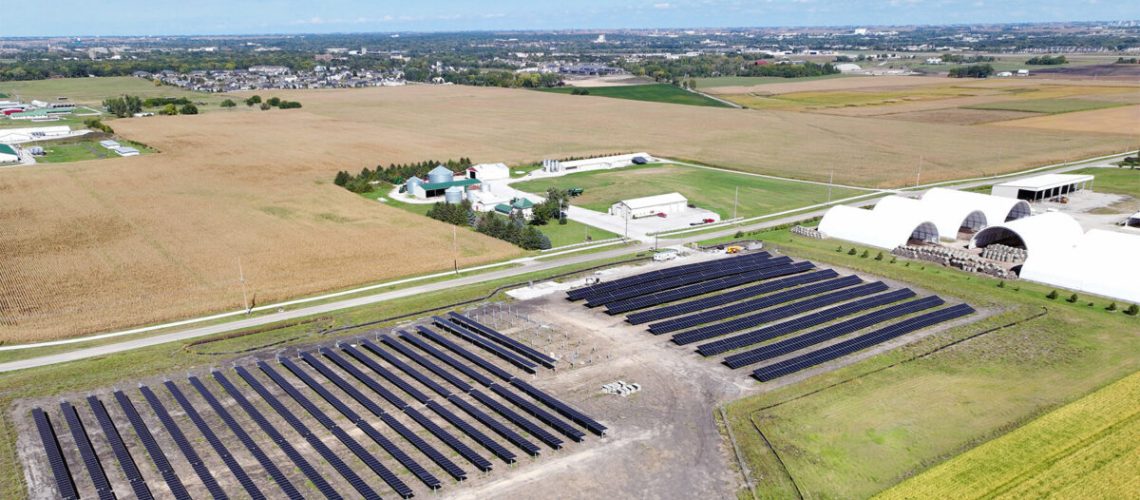Legislation in Missouri aims to launch a three-year pilot program, whereas a new comprehensive community solar policy goes before the House in Iowa.
In Iowa, House Bill 81, which aims to help scale community solar in the state, passed unanimously out of the House Commerce Committee and now goes before the Iowa House as HF 404.
Sponsored by House Commerce Chair Shannon Lundgren (R), the legislation will soon be accompanied by a companion bill in the Senate. If passed, the bill will establish a community solar program as well as economic opportunities across the state, including for small family farmers who can install projects without compromising their crops.
In addition to establishing a community solar program, HF 404 empowers landowners and farmers by creating a new revenue stream while maintaining agricultural productivity. The bill allows for community solar of up to 5 MW on underutilized farmlands. It also allows for solar of up to 20 MW on brownfield sites to prioritize smart land use and minimize impact on prime agricultural land.
“Our Community Solar initiative provides Iowans with more affordable energy options, serving as one component of a broader, holistic energy strategy,” said House Representative Hans Wilz. “By implementing this solution, we aim to generate cost savings for Iowans. Additionally, its smaller scale makes it well-suited for brownfield spaces, underutilized areas that currently have no other viable uses, maximizing efficiency and sustainability.”
Community solar typically involves a customer subscribing to a portion of an off-site solar facility’s generating capacity, receiving credits on their utility bills for the electricity produced by the facility. It can provide solar access to those who live in apartment buildings or don’t have the cash or credit to cover the upfront costs of solar.
During pv magazine USA Week 2024, Jeff Cramer, president and CEO of Coalition for Community Solar Access (CCSA) presented an update on community solar, examining what’s working, where gains are being made and what the U.S. can expect in the future. Cramer emphasized the importance of effective policy, cautioning that only about two-thirds of those states with community solar policy have functioning programs.
Matthew Hargarten, vice president of government and public affairs at CCSA sees the Iowa policy as a move in the right direction.
“Iowa currently does not have an enabling policy for community solar, making HF 404 a landmark bill that would establish a formal program for the first time,” Hargarten said. “Unlike existing small-scale solar programs like net metering, this bill would allow multiple subscribers—businesses, homeowners, farmers, and institutions—to share in the benefits of a single solar facility while receiving direct bill credits on their electric bills.”
Passage of HF404 would encourage increased solar energy capacity in a state that currently ranks 37th in solar installations, according to Solar Energy Industries Association (SEIA).
Missouri pilot
Republican legislators in Missouri introduced bills House Bill 662 and Senate Bill 386 to launch a three-year community solar pilot program intended to provide access to affordable energy throughout the state
The bills were introduced by Republican Representatives Ben Keathley and Senator Curtis Trent.
“I’m proud to be sponsoring community solar legislation that will protect Missourians from rising utility rates, making energy costs more predictable and manageable for working class families,” said Rep. Ben Keathley. “In addition to lowering electric bills, this program will spur economic development, create good paying jobs, support family farms, and help build a homegrown energy industry that will have a real impact on our local economies.”
The bills enable electric suppliers to “allow subscriber administrators and owners or operators of community solar facilities to recruit customers as subscribers and process subscribers’ bill credits as described in the act. Each retail electric supplier shall continue operating its community solar pilot program until the total solar electricity demand equals 5% of the retail electric supplier’s electricity sales for the previous year” as stated in SB 386.
Missouri ranks 36th nationwide in installed solar capacity, according to the Solar Energy Industries Association.
“Current law is stifling innovation in Missouri’s energy markets. With community solar, legislators have an opportunity to cut through the red tape and introduce another tool in the state’s all-of-the above approach to energy,” said Matthew Hargarten, vice president of government and public affairs at the Coalition for Community Solar Access (CCSA). “This legislation will get shovels in the ground and bring more energy choices, more competition, and more opportunities for Missouri families.”



